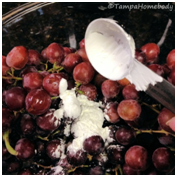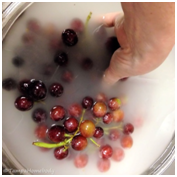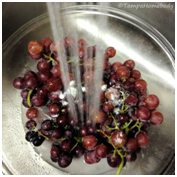7 Smart Tricks to Store Fresh Produce
- GrowNYC Education
- May 8, 2020
- 2 min read
Updated: Apr 13, 2021
1. Make onion, garlic, shallot or garden herbs into olive oil or butter cube.

Directly freezing garlic, shallot or garden herbs will alter their unique tastes. In order to preserve the delicious flavor, peel, crush, slice or chop your onion, garlic, shallot or garden herbs and put them into an ice tray. Cover them with either melted butter or olive oil. Freeze them for about 2 hours, remove them from the ice tray and transfer them into a clean freeze safe container or upcycled zipper-lock bags which can easily last for 6-12 months in the freezer. When you want to use them, you can put the whole oil cube into your favorite dishes, defrost them in a microwave oven (follow your microwave oven instruction), or defrost in the refrigerator.
2. Store fresh herb sprigs like a flower

Trim the ends of basil, parsley or cilantro. Remove the wilting and yellow leaves or parts. Keep them in water on the counter at room temperature for a few days. For extended storage, cover with plastic bag and put in the refrigerator.
For chives, thyme, and rosemary, remove the dirt but do not rinse as they will store better without being wet. Pat them dry and wrap loosely in a paper towel. Place them in the warmest part of your refrigerator/ refrigerator door rack.
3. Asparagus Spears in Water
Trim the ends, store them upright with an inch water by using a large glass, small vase or plastic takeout soup container. Cover with plastic bags and store in the refrigerator. Add water or change clean water when it becomes cloudy (every few days).

4. Celery
Wrapping celery in aluminum foil prevents wilting and rotting. Store them in a crisper or produce drawer and they will last for several weeks. As an alternative, celery also does well standing upright in water, as described above in the asparagus method.

5. Mushroom—cool, dark and dry conditions
Instead of washing mushrooms, use a moist kitchen towel to wipe off dirt and store them loosely in a paper bag, avoiding crushing and bruising. Do not store them in the produce drawer--they like colder temperature and less humidity.

6. Citrus fruits—keep out of direct sunlight
Orange, tangerines, grapefruit and lemons are fine sitting at room temperature for days to a week. Citrus fruits can last longer when you keep in the refrigerator. Before you serve citrus fruit, allow them to sit out and reach room temperature for 15-20 minutes, which makes peeling easier and ensures maximum sweetness.

7. Grapes—keep them unwashed until you are ready to eat
Keep grapes dry! Moisture and mold growth are their enemy. Store grapes in plastic in the produce drawer. Wash them just before you are ready to eat them.
How to wash grapes:
(1) Add a tablespoon of flour into the water, let the grapes soak for about 3 minutes and then gently rub them and rinse with running water. This removes the dirt and white film/substance; this substance, called bloom, is a natural fruit waxy residue to protect many soft fruits from moisture loss and decay.
(2) Sprinkle 1-2 teaspoons of salt and baking soda over grapes, let it sit for a few minutes and rinse with water before eating. Also you can remove the stem, and freeze the grape for future use.








